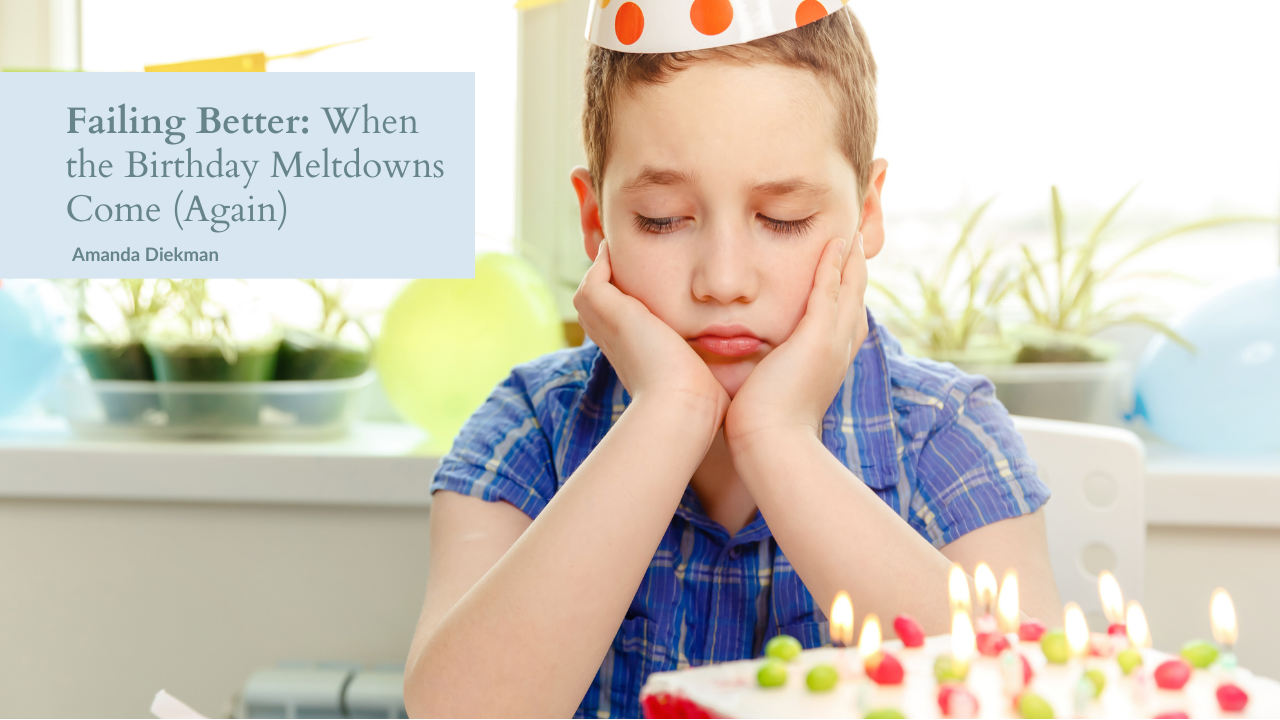Failing Better: When the Birthday Meltdowns Come (Again)
Sep 05, 2025
In a short window of time, all three of my kids celebrate their birthdays. It’s a magical, chaotic, overstimulating, dysregulating, anxiety-fueled few weeks I like to call “Birthday Season.”
Every year, I hold out a tiny flicker of hope that this might be the year we finally get it “right.” That we might thread the impossible needle of meeting every need, preventing every meltdown, and creating family memories that are joyful (never jagged).
It’s a lovely dream. But that’s all it is—a dream.
This year’s Birthday Season? I’d give us a C+.
And I’m proud of it.
Because if there’s one truth I keep returning to in my parenting journey, especially in seasons like this one, it’s this: we can fail better.
We don’t need black-and-white absolute determinations like “success” or “fail.” We don’t need idealized, Insta-ready photoshoots. We don’t need things to be perfect or meltdown-free. I cried after every single birthday party I ever had. Hard things don’t often come without tears or regrets or snapped voices or thrown mini-golf clubs (true story).
We can still “fail.” We just…fail better than we did before.
The Myth of “Nailing It”
So many of us enter parenting with this unspoken pressure to get it right. We’re desperate to stick the landing. To produce a birthday party—or school drop-off, or bedtime routine, or entire childhood—that feels like a highlight reel.
It’s not too much to ask, we wishfully plead with the stars or the universe or with God or our mom on the phone. I just want one single day with no big blow-ups. No messes. No one crying in the car on the way home.
But when we chase this kind of perfection, we trap ourselves in a dangerous binary: either we succeeded, or we failed. Either it “went well,” or it was a disaster. Either we’re a good parent, or a bad one.
And when our kids and teens are neurodivergent, sensitive, anxiety, trauma-impacted (or just a human child having a rough day), that kind of success/failure thinking sets everyone up to feel broken.
What I’m learning in real time is that sometimes the thing that looks like failure is actually growth in disguise. A relational rupture that leads to honest repair. A party that falls apart and opens the door to deeper conversations about fairness, disability, and mutual care. A public blow-up that helps us tell the truth about our family dynamic with a friend or community member.
Two years ago, we had one spectacular crash-and-burn birthday moment. A last-minute decision to bring a younger sibling to his sibling’s birthday party—a decision we all knew was risky, but made in a moment of constraint. And it went exactly how we feared it would.
Painfully.
Publicly.
Badly.
But what came afterward? Days and weeks of conversation. Processing. Naming trauma. Practicing repair. Sharing truths we’d never spoken aloud.
That party wasn’t a success by any traditional measure. But it was a massive leap forward in what matters most to me: helping my kids learn to feel safe, seen, and supported—even when things fall apart.
The Real Work: What Do We Actually Need?
So much of our internal panic when things “don’t go well” stems from unexamined fear.
We want the birthday to feel special—why?
We want it to go smoothly—why?
We want everyone to be happy and grateful and get along—why?
When I slow down, I realize I’m often trying to meet five or six different needs at once: the need for validation that I’m a good mom. The need for peace in our family dynamic. The hope that my child will feel celebrated and included.
It’s a tangled web.
Low demand parenting doesn’t ask us to stop caring. It invites us to care differently. To get clear on what we actually need. To notice which needs are ours and which belong to our children. To soften the fear that if something goes sideways, we’ve somehow failed at love.
And when we start naming the real needs—connection, belonging, co-regulation, joy—we can build birthday plans (or any plans, really) that align with reality, not fantasy. We can drop the demand that everything go well, and instead design experiences with stretch, support, and softness already built in.
Sometimes that means scaling way back. Sometimes it means planning for a meltdown instead of trying to prevent one. Sometimes it means choosing to prioritize our own ease over Pinterest-level décor.
And sometimes, it means totally blowing it, and loving each other anyway.
The Shame Trap
There’s real psychological research behind all this, too. Shame researcher Brené Brown writes that “shame corrodes the very part of us that believes we are capable of change.” When we attach our worth to how well a birthday goes—or how well we handle it—we feed the lie that only flawless parents are worthy of love. That only perfect memories can hold joy.
But connection doesn’t require perfection. In fact, our children learn most from how we show up when someone misses the mark.
I’ve stopped trying to prevent all the pain and disappointment. Now I try to be someone they can trust to walk through the hard stuff with them.
This Is What It Means to Grow
This year, Birthday Season has delivered both anxiety and hard-won wins. One child asked for accommodations in advance—anticipating their triggers, asking for what they needed, and staying regulated(-ish) through it all. That’s a triumph. That’s what trust and co-regulation can grow into. I celebrate that.
Another child didn’t have such smooth sailing. That’s okay too.
Some years, there are tears and thrown objects. Some years, we hear one kid angrily exclaim. “You are never invited to my birthday party again!” But we also see repair, and forgiveness, and compassion.
Oh and me? I got older too.
I let go of some things I used to think were essential. I clung tighter to the things that actually are. I failed. I learned. I loved. And I failed better.
So if you’re heading into birthday season—or any demanding season—take this with you:
- Let it be messy.
- Let it be real.
- Let it teach you something you didn’t know yet.
And when it all feels like too much, I’ll be over here lighting candles with a side of quiet defiance, whispering to myself: We’re not here to nail it. We’re here to love each other through it.
Even if the cupcakes melt and the balloons pop and we throw a mini-golf club in the lake. We’re still growing. Still loving. Still here. And that’s more than enough.
Quiz: "Why is everything so hard?"
................
Get your quiz results and discover one concrete next low-demand step toward ease and joy.
Low Demand in your Inbox
Juicy weekly emails include real-life parenting stories, low-demand ideas and tips, plus a collection of my favorite resources. A goodie-box of an email.
We hate SPAM. We will never sell your information, for any reason.

